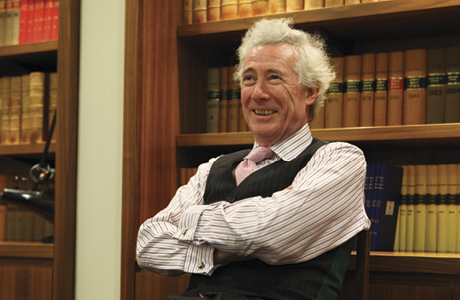Subject: Legal debate.
Parliamentary Committee Hearings are sometimes a privileged in which we can hear debate of an extremely high standard, especially when we listen to argument between experts and especially so when the argument is on matters of law. Law has always been arcane and mysterious, the pomp and circumstance of court proceedings, the method of address and the respect the judge demands is theater to the common man or woman, it baffles and intrigues the sense of ordinary conversation and the ordinary persons sense of right and wrong. Clever barristers, fluent in the language of the law can find ways to seek the release of people who are clearly bad whilst reducing the testimony of someone who is respectable, merely doing their duty by repeating what they saw, only to have their words twisted on interrogation. The law is full of contradiction with inappropriate licence taken of rulings made decades ago when the ruling opinion was very different to today, where in today's world greater and greater persuasion is given to the rights of the individual, especially those in a minority so that often law seems to lack what we all crave, 'common sense'.
Tonight instead of being out on the town having a drink in the pub or a meal in a restaurant I'v been fascinated by the opportunity to listen to the legal professions top guns debate their own take on the recent High Court ruling on Boris Johnson's attempt to shut down parliament. Every word and every phrase of these razor sharp minds as they pick there way over the stepping stones of a fast moving stream was a sort of music to my ear. Language is the tool by which they express the workings of a legal mind clearly enunciating High flown legal opinion. Two Professors of Law from no less an elevated body as Oxford University, disagreed on the principles of their findings, for or against the High Court ruling, whilst Lord Sumption, the recently retired High Court Judge who has just finished a series of Reith Lectures on the matter in hand, the power of Parliament vis a vis the Courts, shed more light on the intricacy of his own thinking
Lord Sumption is of the opinion that the Court was placed in a position where it had to rule against the executive government because the Prime Minister had effectively removed parliament from its role of overseer of government by proroguing parliament for five weeks in the run up to the date when the country was faced with leaving the EU. The Law Lords thought that this was illegal and forced parliament to resume its sitting.
On the other hand Sumption thought that, particularly the European Court had strayed too far into the realm of making law not just applying it. The Human Rights Acts were a particular example where the courts define the rights and set the parameters for statutes to then be passed by parliament. He instances that over the last two decades the British courts had followed European practice and felt, traditionally and constitutionally, Parliament, as the representative body representing the people, should first initiate acts which then become law on the assumption that people have (used to) faith in their parliament, on the basis that they play an important part in choosing the make up of parliament at a general election. Legal bodies on the other hand are made up of a small specialised segment of society and are not properly representative.
The minutiae, the clarity, the insight fullness, paring down to the bone of the matter were all on display for nearly three hours of intoxicating reasoning. It was by far more fulfilling than a pint in the Dog and Duck and whilst for many it would be seen as a waste of their time it's a pity more people don't spend the time and effort to glean the facts rather than swallow, hook line and sinker the latest headline from the Daily Express.

No comments:
Post a Comment